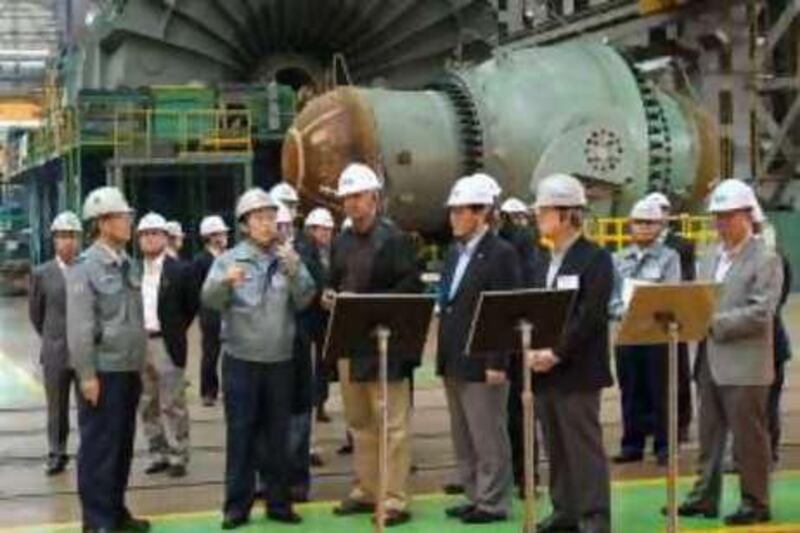SEOUL // The UAE's peaceful nuclear energy programme is a guarantee of the nation's development, Sheikh Mohammed bin Zayed, the Crown Prince of Abu Dhabi and Deputy Supreme Commander of the Armed Forces, said yesterday. "There is a dire need to develop alternative sources of clean, efficient and safe energy to serve the needs of continuing development and guarantee that the population growth and urban development are properly supported," Sheikh Mohammed said.
The Crown Prince was speaking on a visit to South Korea's most advanced nuclear plants near the city of Busan. He arrived in Seoul on Tuesday and held talks with the president, Lee Myung-bak. He concludes his visit today. Sheikh Mohammed was at the head of a high-level economic and diplomatic delegation that included Sheikh Abdullah bin Zayed, the Foreign Minister. The UAE agreed a US$20 billion nuclear power plant deal with South Korea in December.
"The Emirates will continue, as part of its development vision, the building of its peaceful nuclear programme for its pragmatic and promising prospects that will support the wheel of sustainable development," Sheikh Mohammed said. He said that he was confident that the UAE-Korean partnership in peaceful nuclear energy was "the beginning of a long-term relationship ? that would foster the development of the Emirates."
In 2008 the UAE, faced with projected future power shortages, announced the details of a strategic plan to secure electricity through the use of nuclear power. According to official figures, the national annual peak demand for electricity will to rise to more than 40,000 megawatts by 2020, reflecting a cumulative annual growth rate of roughly 9 per cent. Companies from the US, France and Japan competed to build four nuclear reactors in the UAE, but a consortium of Korean firms won the contract last December. The $20 billion deal marked Korea's first export of nuclear power plants, 30 years after the first nuclear reactor was built in the country. The project is expected to require an additional $20 billion in operation costs over the course of 60 years after the construction of the reactors.
The consortium, led by the Korea Electric Power Corp (Kepco), also includes Samsung, Hyundai and Doosan Heavy Industries from Korea, the US firm Westinghouse, and Toshiba of Japan. Yesterday Sheikh Mohammed visited Doosan's industrial facilities, including the sections manufacturing casting and forging products, which are essential for the construction of power plants. Doosan has already been involved in major projects in the UAE; in 2001 it was awarded a contract to build a power and desalination plant in Fujairah.
Gee Won Park, Doosan's chief executive officer, said the four reactors would not only serve the UAE's increasing power demand, but also preserve the oil and gas reserves for future generations. Currently, power plants in the UAE are fuelled by oil and gas. The first of the reactors is expected to be operational by 2017. Last month, Abu Dhabi's nuclear energy company chose a remote stretch of beach west of Ruwais as the site for the nuclear power stations.
The Crown Prince also visited the Shin-Kori nuclear power plant construction site, the design of which will be used to build the reactors near Ruwais. According to Kepco, the 1,400MW advanced power reactor is an improved version of older South Korean reactors in terms of safety and efficiency. The Abu Dhabi Government expects the four plants to deliver within a decade almost a quarter of Abu Dhabi's power and to be staffed by more than 2,000 engineers and other workers.
Sheikh Mohammed met the South Korean president last month at the Nuclear Security Summit. He also visited Seoul in 2006. The UAE is South Korea's second largest oil supplier, and the UAE is the second largest importer of South Korean products in the Middle East. Last year, the trade volume between the two nations increased by 43 per cent from the year before. More than 120 South Korean companies have operations in the UAE, mostly in information technology and heavy industries.
Sheikh Mohammed's visit was a sign of the deal's significance for both countries. "The UAE is going in two directions with regards to alternative energy, one of them is Masdar by using solar energy, and the second one is the nuclear programme which strategically is a great move to have an alternative to gas and oil because it is clean energy," said Abdulaziz Sager, the chairman of the Gulf Research Centre.
"The only concern is, God forbid, the safety issue, that's why Korea is a good example to look at because they've head their programme for four or five years without any problems.Also the visit established a strategic relationship, because Korea is one of the biggest importers in the Gulf, maybe it is second after Japan, it can also be used as a reservoir for fuel." South Korea also acts as a good example for the UAE since it is a signatory of the Non-Proliferation Treaty (NPT), he said.
mhabboush@thenational.ae
Sheikh Mohammed emphasises need for alternative energy
Crown Prince in South Korea says UAE's nuclear energy programme is guarantee of nation's development.

Editor's picks
More from the national





